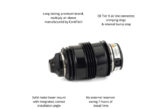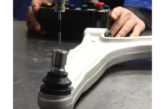PMM reviews some of the most common disputes investigated by The Motor Ombudsman, as part of its work to help drive even higher standards of work and service, and give consumers added protection, peace of mind and trust during the repair process.
Case 2: Dispute resulting from fuel system diagnosis
What was the issue raised by the customer?
Mr D took his car to a garage to investigate a shuddering problem, which subsequently revealed a corroded rear heat shield. This was replaced at a cost of £300 to Mr D. The issue persisted, and the car was taken back to the same garage by the customer who then identified the defect as being a leaking fuel pump which had contaminated the fuel system. Mr D received a quote totalling £1,200 to rectify it, but deemed this financially unviable, so opted instead for a brand new replacement car.
Aware of the issue, a neighbour offered to buy Mr D’s existing car, who took it to another garage for an inspection. After looking at it, they explained that there was no fuel contamination and the fuel filter just needed replacing. The car passed its MOT a month later.
As Mr D had decided to buy a new car based on what he has told, Mr D thought the first garage’s misdiagnosis caused him to be out of pocket, and therefore wanted a refund for the cost of the new vehicle. The garage turned down this request because they stood by their findings and had video evidence of the fuel filter’s condition. However, they offered to re-diagnose the vehicle and change the fuel filter for free, and said Mr D could cancel his order for the new car. Mr D and the garage couldn’t come to an agreement on a resolution of this dispute, and The Motor Ombudsman was therefore asked to investigate the complaint.
How was the problem overcome?
The Motor Ombudsman adjudicator thought that the first garage had acted fairly, and that there wasn’t a breach of the Motor Industry Code of Practice for Service and Repair. The garage provided the video of the vehicle health check where it could clearly be seen that the fuel filter was in a very poor condition. The second garage had also sent an e-mail to Mr D saying that the fuel filter was clean. It was unclear why the second garage would say the filter was clean when it wasn’t, and Mr D’s initial complaint was that he was told only the fuel filter required replacement, meaning his dispute was over the issue of contamination. Mr D wanted to rely on the second garage’s e-mail as proof that the first garage had misdiagnosed his vehicle, but the information didn’t appear to be credible. Therefore, no award could be made to the customer by The Motor Ombudsman.
How can a situation like this be avoided in the future?
In this case, the garage did the right thing by keeping a record of everything they had seen in the car. This can be achieved by doing a video of the visual health check, by taking photographs, or by a technician writing comprehensive notes at the time of inspecting the vehicle. This ensures that if a dispute arises, there is sufficient evidence that can be relied upon to demonstrate the validity of a diagnosis.










